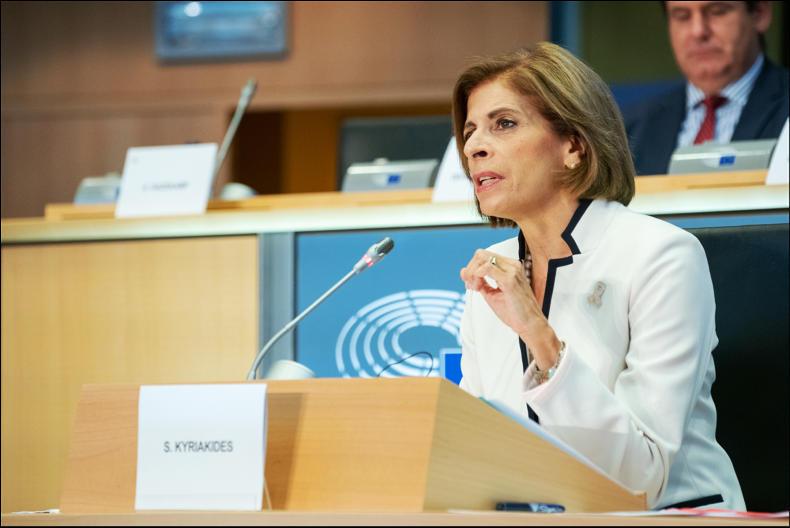The Common Agricultural Policy (CAP) will be the main tool to incentivise reductions in pesticide, fertiliser and antibiotic usage set out in the Farm to Fork strategy (F2F), according to the European Commissioner overseeing its development.
Health and Food Safety Commissioner, Stella Kyriakides, is overseeing agriculture’s roadmap under the EU’s Green Deal initiative – not the sitting Agriculture Commissioner Janusz Wojciechowski. It will be published next week on 20 May.
Kyriakides told MEPs on Monday that the strategy aims to redesign how food is produced, distributed and consumed in the EU. The food chain will have to to treat “economic, environmental, and societal concerns” in parallel she said.
Actions
Kyriakides noted: “We foresee both legislative and non-legislative actions to improve sustainability at all parts of the food chain. This includes concrete actions, and targets and priority areas. In particular, to curb the risk, and use of chemical pesticides and to reduce the use of fertilisers and antibiotics.”
The Cypriot politician said the strategy was not to penalise or punish farmers, but to help them move towards more sustainable farming practises. She said along with a just transition fund, the CAP would be the main instrument used to provide support to primary producers.
The strategy will not impose new rules or restrictions, the day it is published, Kyriakides stressed.
“It is a plan to work in close cooperation with farmers and fishermen and provide the right support to enable them to feed Europe, to protect the environment, to strengthen their competitiveness and lead the global transition to more sustainable practices.”
Imports
Irish Independent MEP Luke ‘Ming’ Flanagan raised concerns that if European farmers may be left exposed to the importation of cheaper products that do not meet the same standards from outside the EU.
In response, Kyriakides said the EU needs to work with its international partners to raise standards globally, intoduce an appropriate labelling scheme to incentivise trade partners, and to ensure that food imported into the EU is produced in a sustainable way.
Read more
Farm to Fork strategy will shape Irish agriculture for a decade
No more delays to Europe’s Farm to Fork strategy
The Common Agricultural Policy (CAP) will be the main tool to incentivise reductions in pesticide, fertiliser and antibiotic usage set out in the Farm to Fork strategy (F2F), according to the European Commissioner overseeing its development.
Health and Food Safety Commissioner, Stella Kyriakides, is overseeing agriculture’s roadmap under the EU’s Green Deal initiative – not the sitting Agriculture Commissioner Janusz Wojciechowski. It will be published next week on 20 May.
Kyriakides told MEPs on Monday that the strategy aims to redesign how food is produced, distributed and consumed in the EU. The food chain will have to to treat “economic, environmental, and societal concerns” in parallel she said.
Actions
Kyriakides noted: “We foresee both legislative and non-legislative actions to improve sustainability at all parts of the food chain. This includes concrete actions, and targets and priority areas. In particular, to curb the risk, and use of chemical pesticides and to reduce the use of fertilisers and antibiotics.”
The Cypriot politician said the strategy was not to penalise or punish farmers, but to help them move towards more sustainable farming practises. She said along with a just transition fund, the CAP would be the main instrument used to provide support to primary producers.
The strategy will not impose new rules or restrictions, the day it is published, Kyriakides stressed.
“It is a plan to work in close cooperation with farmers and fishermen and provide the right support to enable them to feed Europe, to protect the environment, to strengthen their competitiveness and lead the global transition to more sustainable practices.”
Imports
Irish Independent MEP Luke ‘Ming’ Flanagan raised concerns that if European farmers may be left exposed to the importation of cheaper products that do not meet the same standards from outside the EU.
In response, Kyriakides said the EU needs to work with its international partners to raise standards globally, intoduce an appropriate labelling scheme to incentivise trade partners, and to ensure that food imported into the EU is produced in a sustainable way.
Read more
Farm to Fork strategy will shape Irish agriculture for a decade
No more delays to Europe’s Farm to Fork strategy






 This is a subscriber-only article
This is a subscriber-only article










SHARING OPTIONS: